This Apple Strudel recipe (Apfelstrudel in German) is easier than it seems and so much fun to make. And the resulting strudel is a delicious, festive dessert just like the ones you would get in Austria or Germany filled with sweet, spiced apples and raisins in a flaky crust that everyone will love!
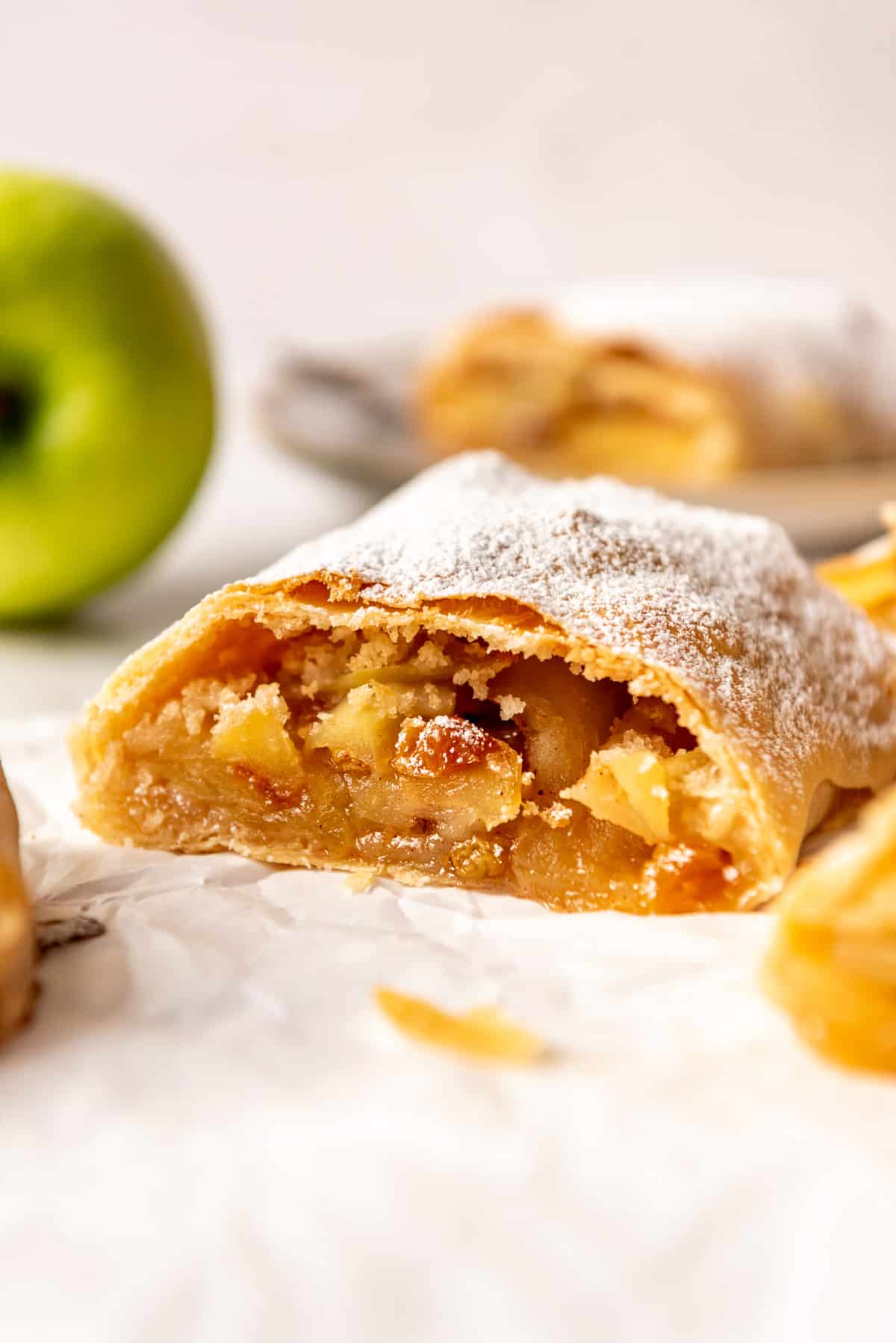
For more German and Austrian-inspired recipes, you should try my German Apple Cake (Apfelkuchen), Hazelnut Lingonberry Linzer Cookies, or my German Apple Pancakes!
Table of Contents
The idea of making real, authentic apple strudel from scratch might deter some from attempting it, but really, it’s simpler than you might think. This recipe will walk you through the process with all my tips and tricks to make it easy and give you great results the very first time!
Why This Recipe Works
- Since there is no yeast, the dough won’t rise during the resting time, but the acid from the vinegar will relax the gluten strands which will become more elastic and make the dough easier to stretch!
- Some people cheat the system and there are recipes for apple strudel that use sheets of phyllo dough rather than making strudel dough. But we’re not scared of trying to make real German apple strudel from scratch, are we? No.
- The simple, sweet filling is made with fresh apples, cinnamon, sugar, and raisins for an authentic taste based on the many slices of apple strudel I ate while in Germany!
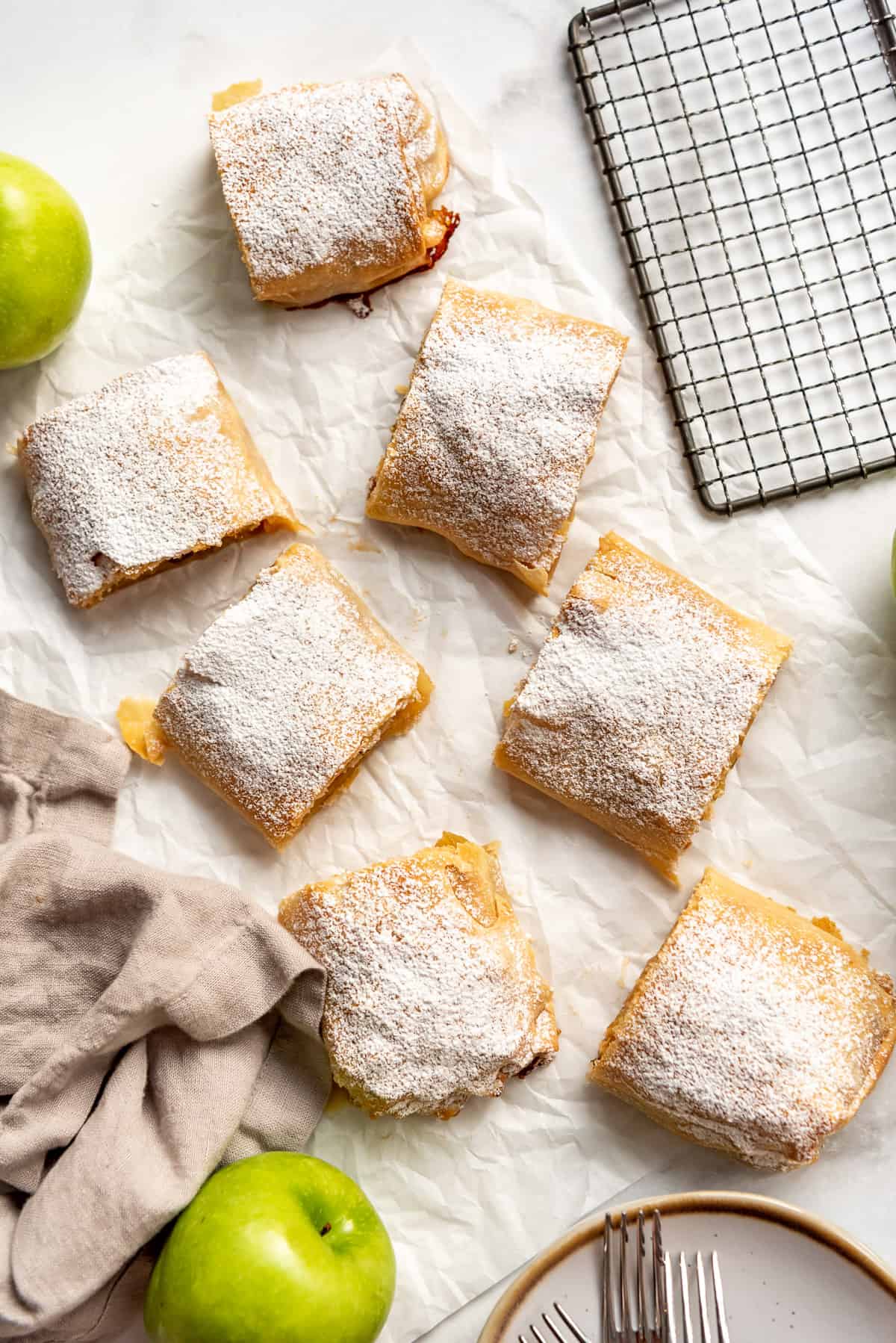
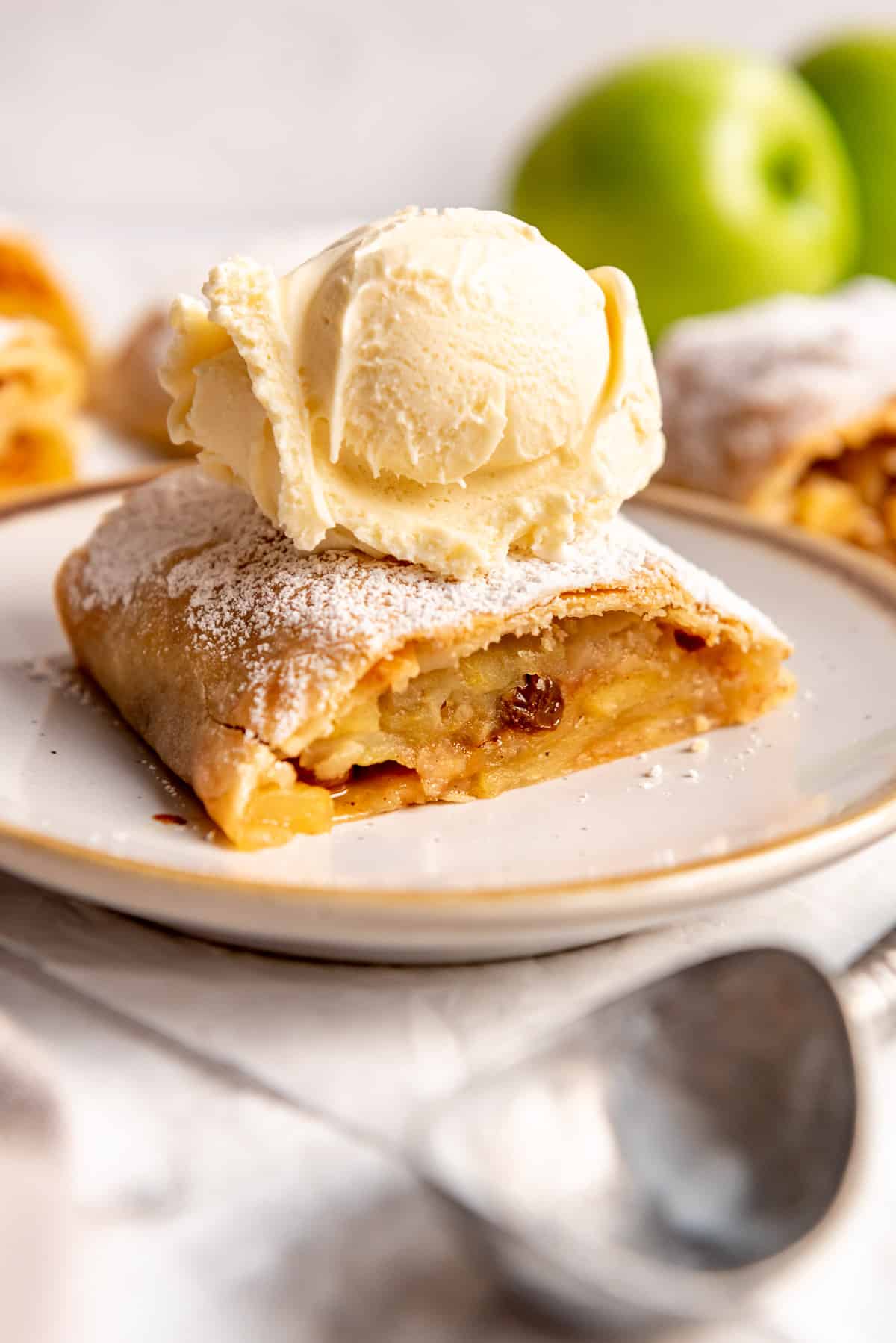
I took German all through high school and college. My dad lived in Austria for two years and I thought that if I learned the language too then he and I would be the only ones able to speak it and no one else would understand. I thought that would be the best thing ever.
Except it turned out that my father had forgotten most of his German. And now, sadly, so have I!
I still love and adore all things that remind me of Germany and its language, culture, people, and of course, food. There is just something about Germany that feels so Christmas-y. One of our family Christmas traditions is to have a Weihnachten dinner at our favorite German restaurants. One of my bucket list items is to visit the Striezelmarkt (the famous Christmas market dating back to the 1400’s) in Dresden one of these years.
This is a delightful Fall dessert to serve with all the fresh apples that come into season, but it is also so perfectly Christmas-y since the song “My Favorite Things” from “Sound of Music” seems to have become a Christmas song and it includes the line about “crisp apple strudel”.
Which I sort of think is a misnomer – a real strudel, from what I have experienced, doesn’t seem to be so much “crisp” as possibly “flaky” with delicate layers of strudel pastry created by rolling the thin strudel dough with a thin layer of butter around and around the strudel as the whole thing gets rolled up.
Ingredient Notes
- Apples: My favorite apples for making strudel are Granny Smith (because they are tart and hold their shape), Golden Delicious (because they are sweet with a cider taste), and Honey Crisp or Envy (because they fall somewhere between the two). I recommend at least 2 types of apples, rather than just one kind.
- Raisins: I specify golden raisins in this recipe because I really prefer them in most baking and feel like they have a subtler raisin flavor than the dark raisins. Just plump them in some hot water for 10 minutes before adding them to your strudel so they are nice and soft.
- Lemon juice or vinegar: A small amount of either acid helps the dough relax and gives it some of its elasticity so it’s easier to stretch out really thin without tearing as much.
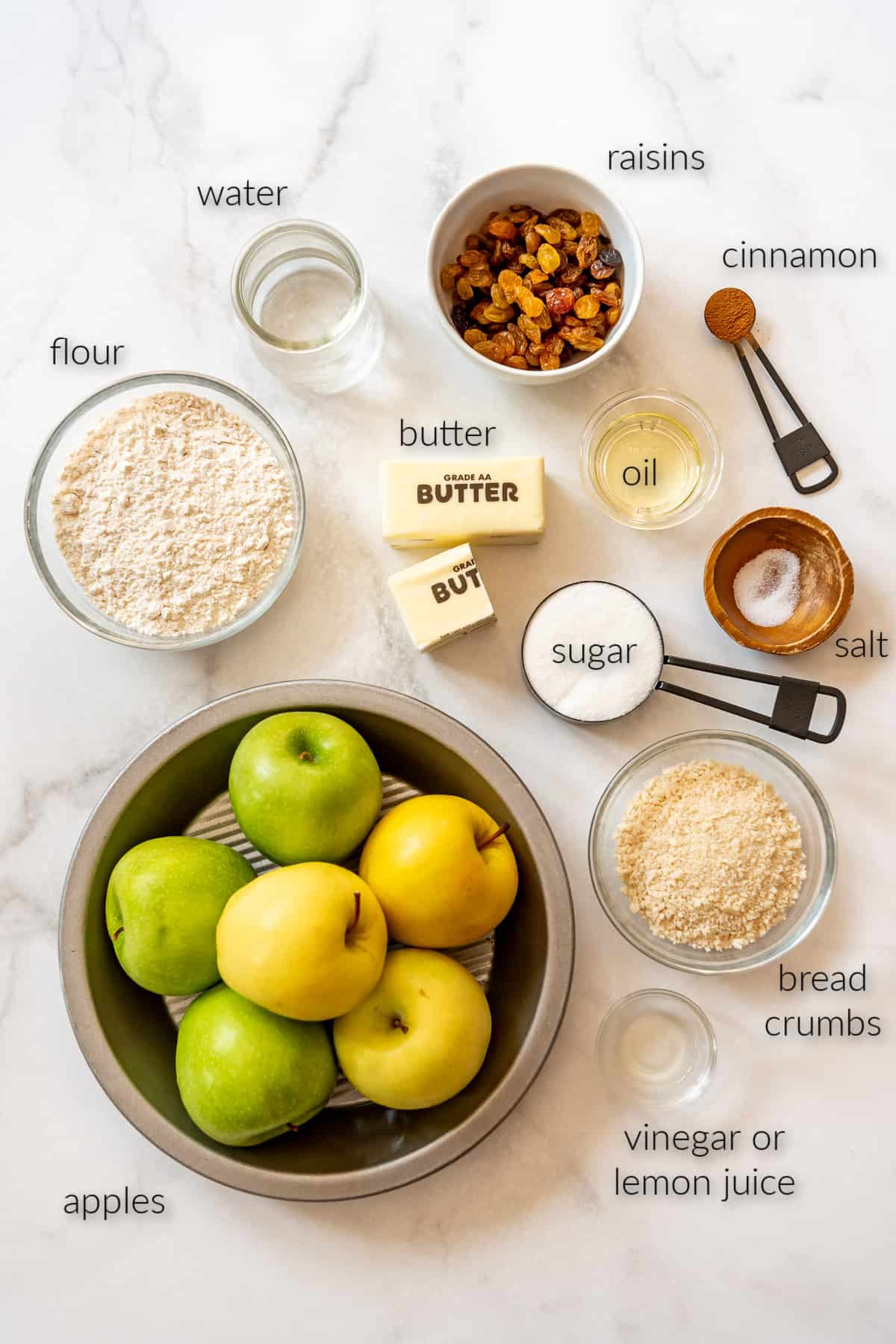
How to Make Apple Strudel
When making a traditional apple strudel recipe from scratch, the only potentially intimidating element is the strudel dough. Rather than rolling out the dough, which is more familiar to most Americans, homemade apple strudel dough gets stretched thinner and thinner, until it is so thin that you could read newspaper print through it.
Like, it’s actually a thing to stick a piece of newspaper under the dough and see if you can read what’s on it. I used a patterned tablecloth to achieve the same result when making this apfelstrudel recipe.
It’s easier than it sounds to stretch your strudel dough as thin as you need it. The trick is to use an acid like apple cider vinegar or lemon juice in the strudel dough, knead the dough well to develop the gluten, and then let it rest so that it can fully relax before you attempt stretching it.
- Start by making the pastry dough, which is just five ingredients. Mix the flour and salt in a large bowl. I find it easiest to use my stand mixer to do this, but it could be done by hand. With the mixer on low speed, add the water, oil, and lemon juice or vinegar. It should start to form a shaggy dough.
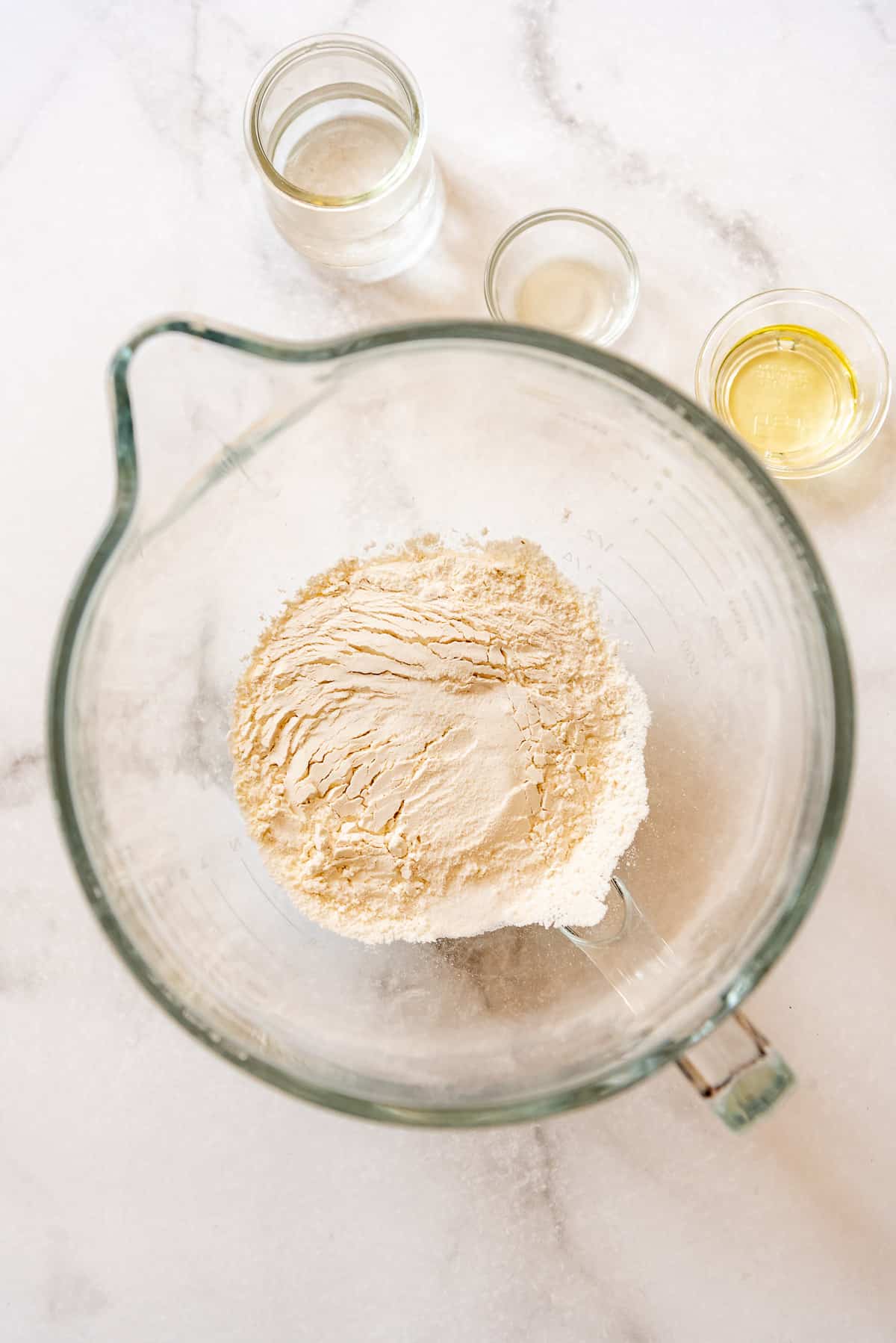
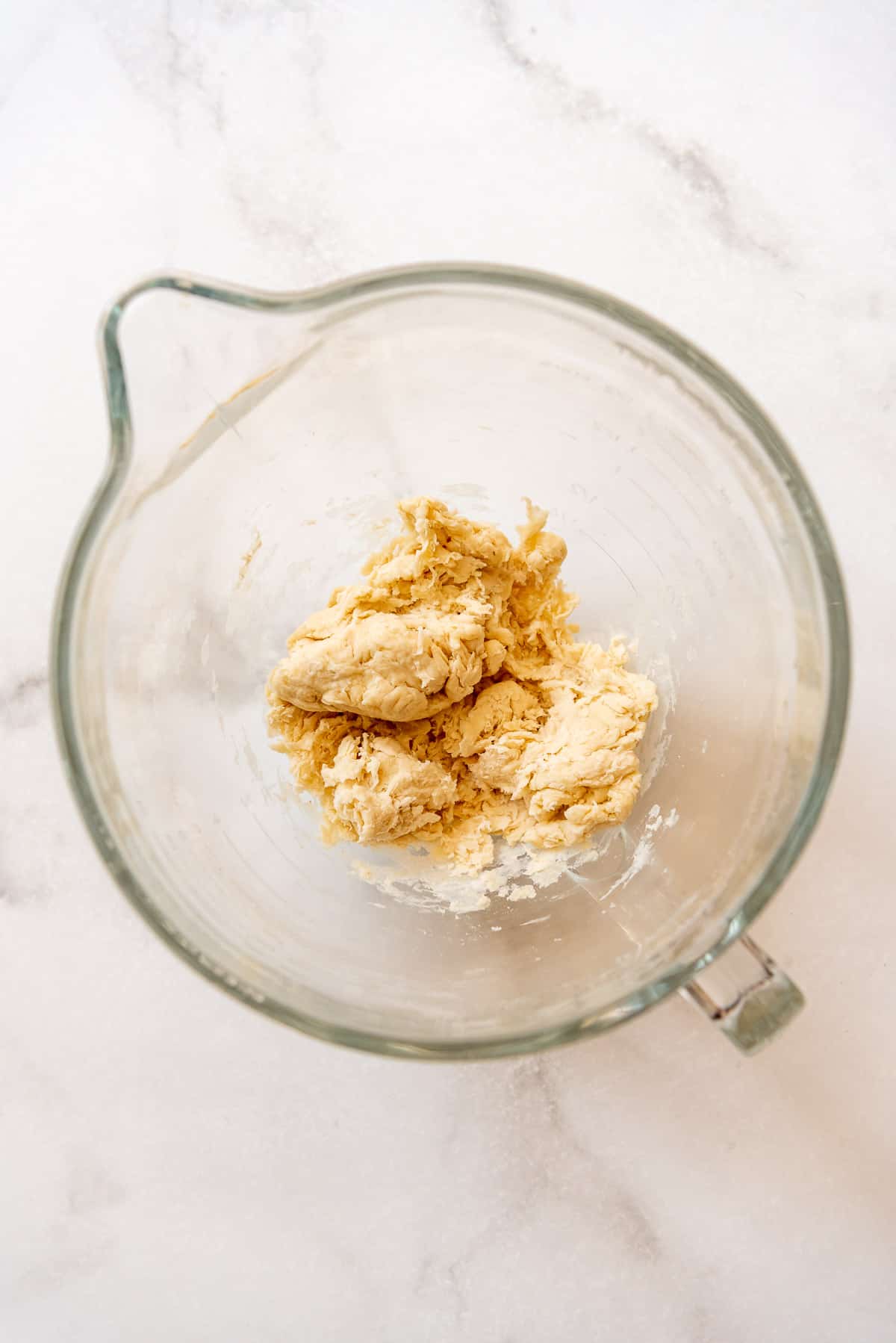
- Switch to the dough hook attachment and continue to knead the dough for 2-3 minutes until it starts to come together in a ball. If the dough is too dry, add a little additional water onto it so it comes together.
- Remove the dough from the mixer and knead it by hand for a couple of minutes on the counter. Go ahead and slam it down on the counter a couple of times during the process. The purpose is to develop the gluten so you will have a nice, elastic dough later on.
- Place the dough in a light greased bowl, turning to coat the ball of dough, then cover with a piece of plastic wrap and let the dough rest for 60 to 90 minutes. It won’t rise because there is no yeast, but the dough needs this time for the gluten to relax. If you tried to roll or stretch it out at this point without resting it wouldn’t work very well.
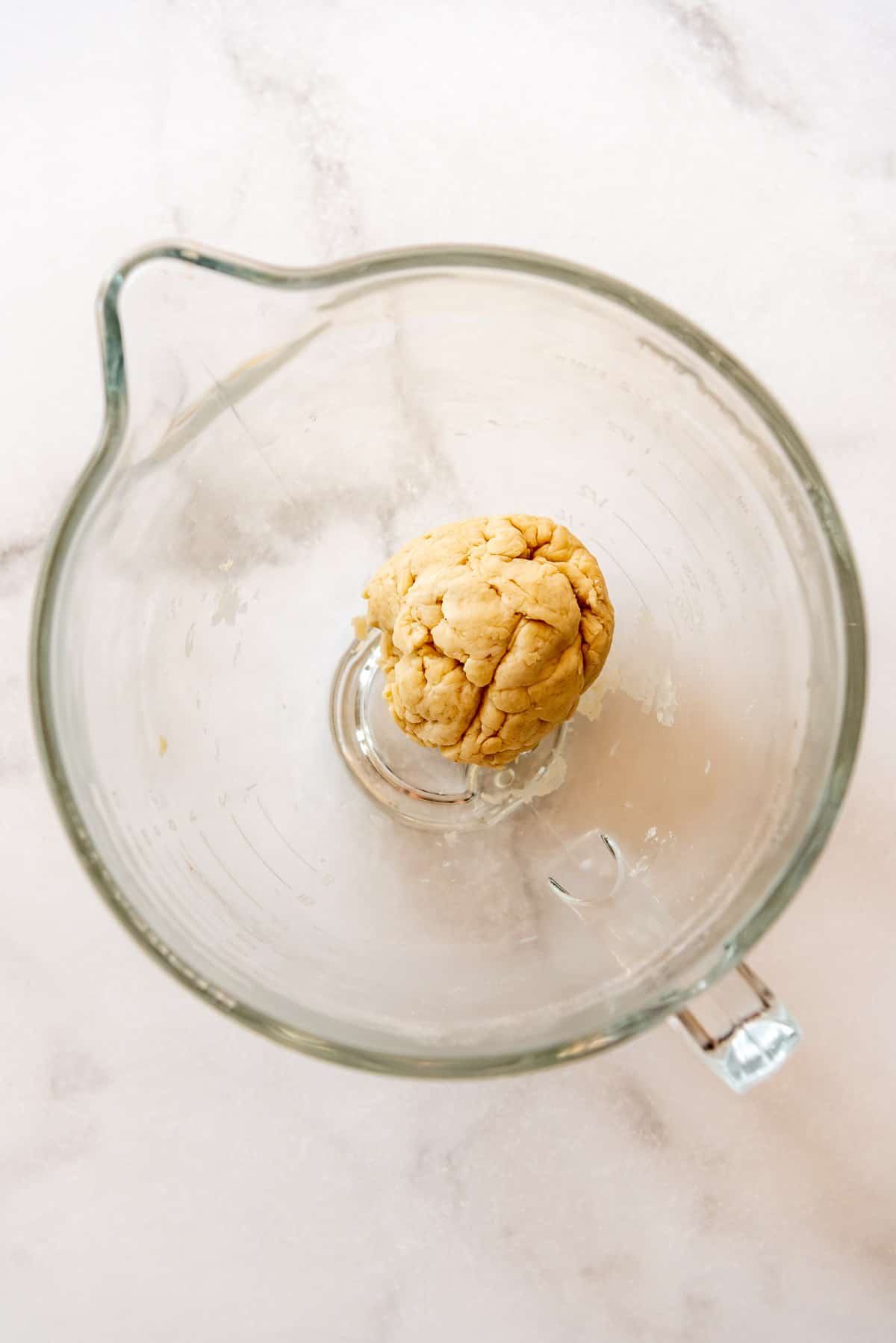
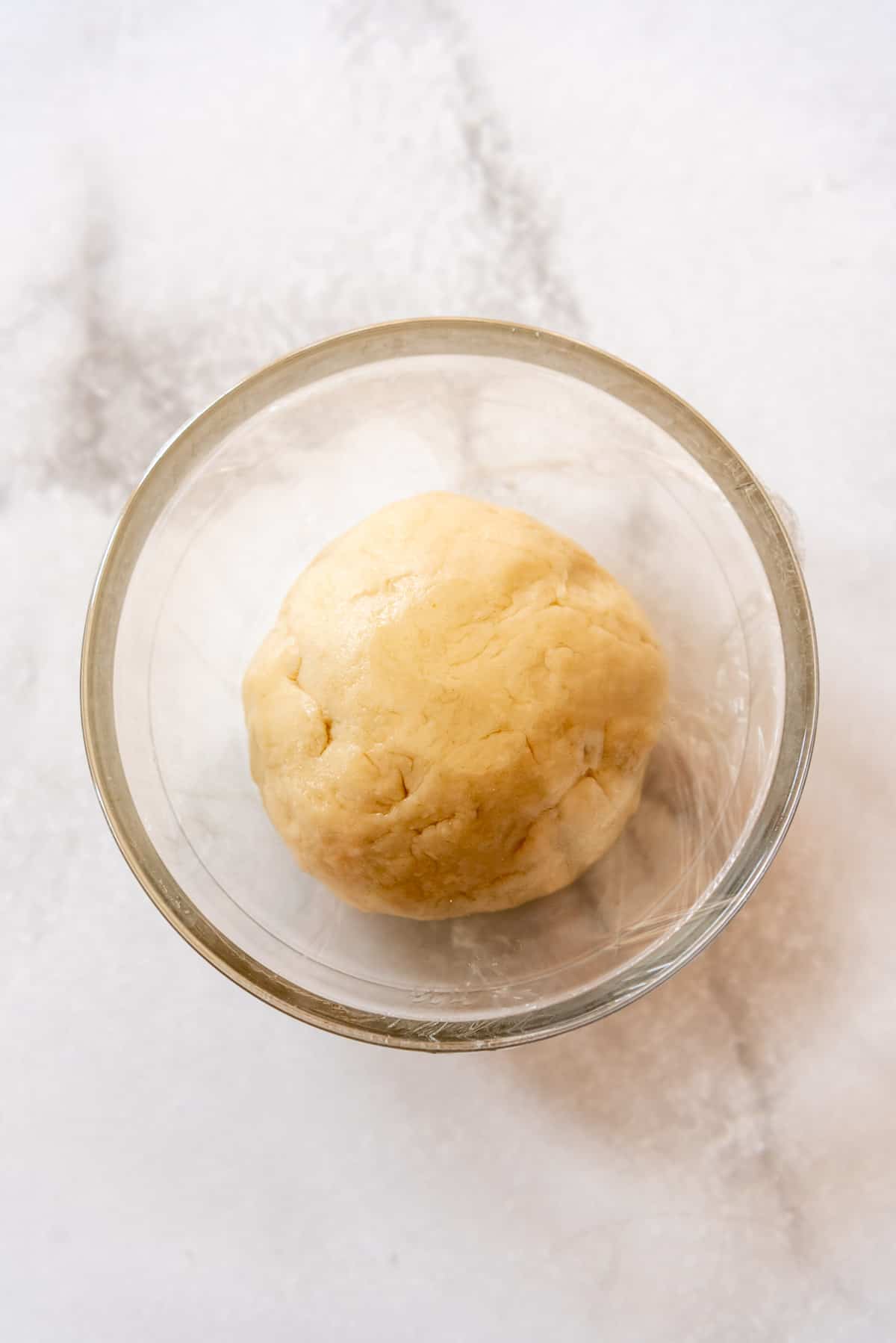
- While the dough is resting, soak the raisins in hot water for 10 minutes and mix the cinnamon and sugar together in separate bowls.
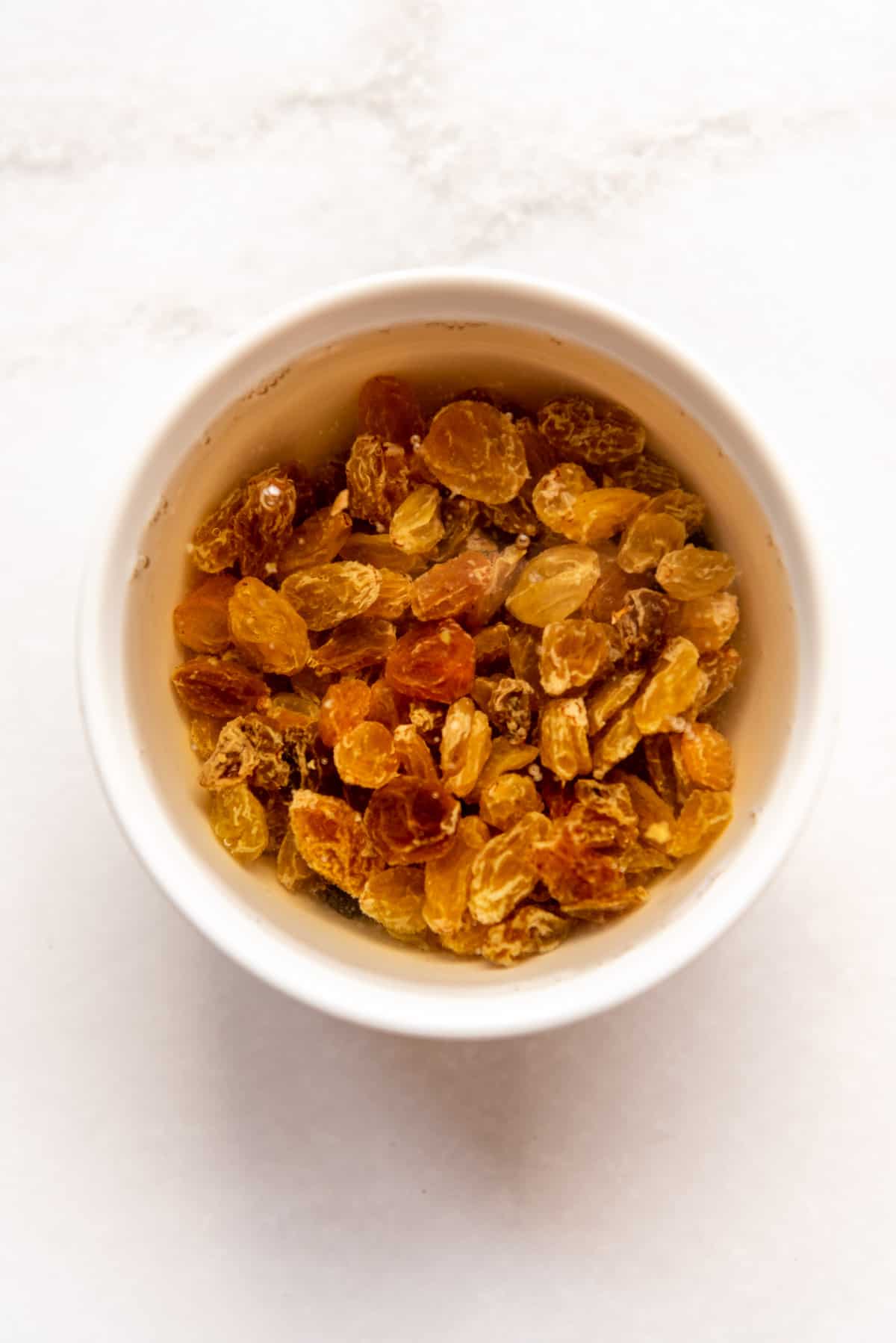
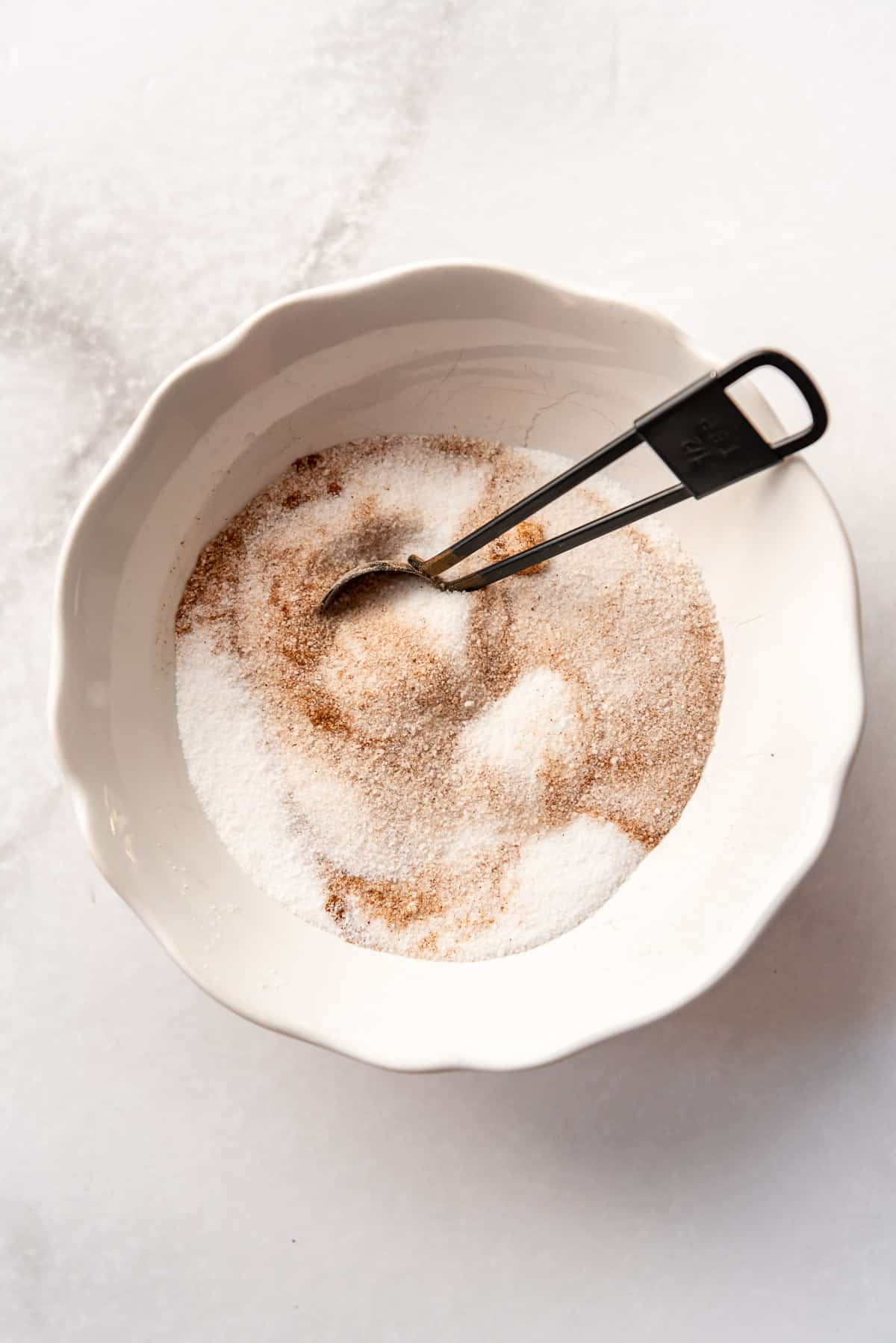
- When the dough has rested sufficiently, divide it in half (unless you are making one large strudel) and roll one of the balls into a rectangle, just to get things started. There’s no required dimension or thickness, just roll it out a bit (about the size of a large piece of paper will do) so you aren’t stretching a big ball of dough. Then transfer it to a large area covered in a large, clean tablecloth or bed sheet.
- Working your way around all sides of the dough, gently stretch and pull the dough away from the center, until it forms a very large, very thin rectangle. If you get some holes, no worries. Eventually you are going to roll the whole thing up and no one will be the wiser.
Pro Tip: One of the ways I have had the most success is to lift and stretch the dough by sliding my hands underneath (be sure to remove rings in advance!) with palms down and gently pulling the dough out from the center, letting it slide off my knuckles as it stretches.
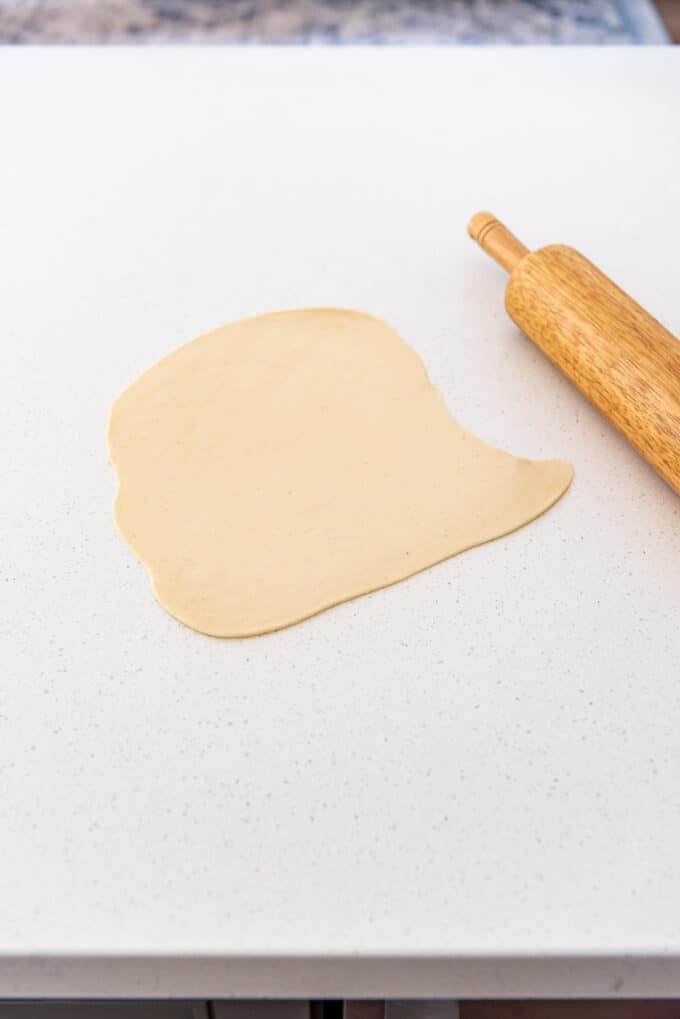
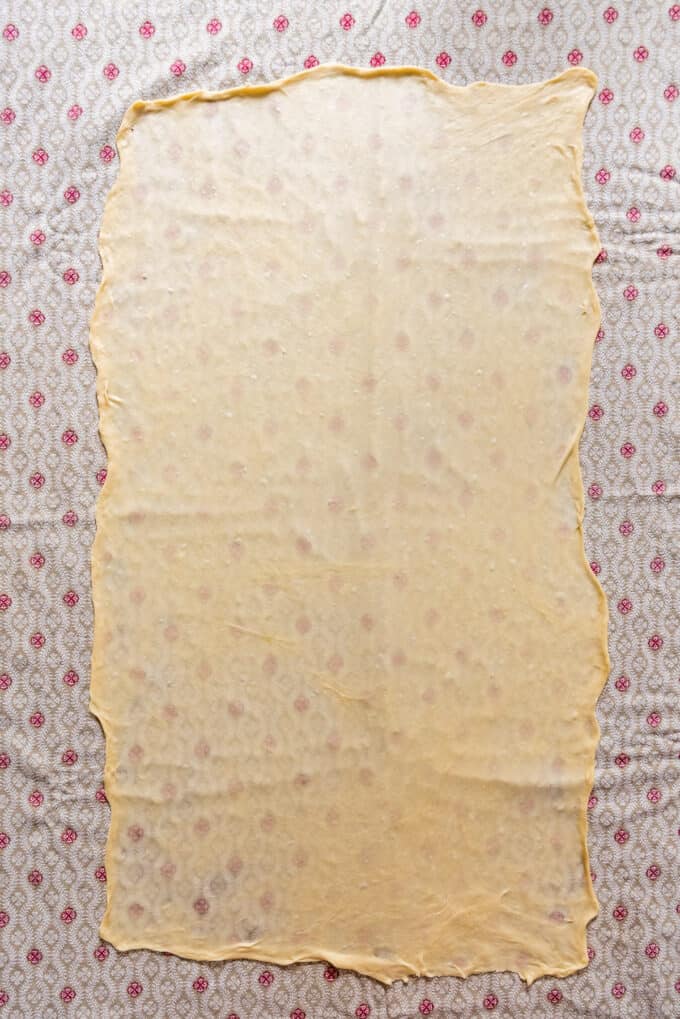
- Once your apple strudel dough is sufficiently thin enough for you to see the pattern of your tablecloth through it, gently spread it with butter and sprinkle half of it with the breadcrumbs. These will soak up some of the juice released from the apples as they cook so you don’t end up with a soggy strudel.
- Then arrange half of the apples over the breadcrumbs and butter on half of the dough, leaving a couple inches of border around the edges. Drain the plumped raisins and sprinkle half of them over the top, then sprinkle with half of the cinnamon-sugar mixture.
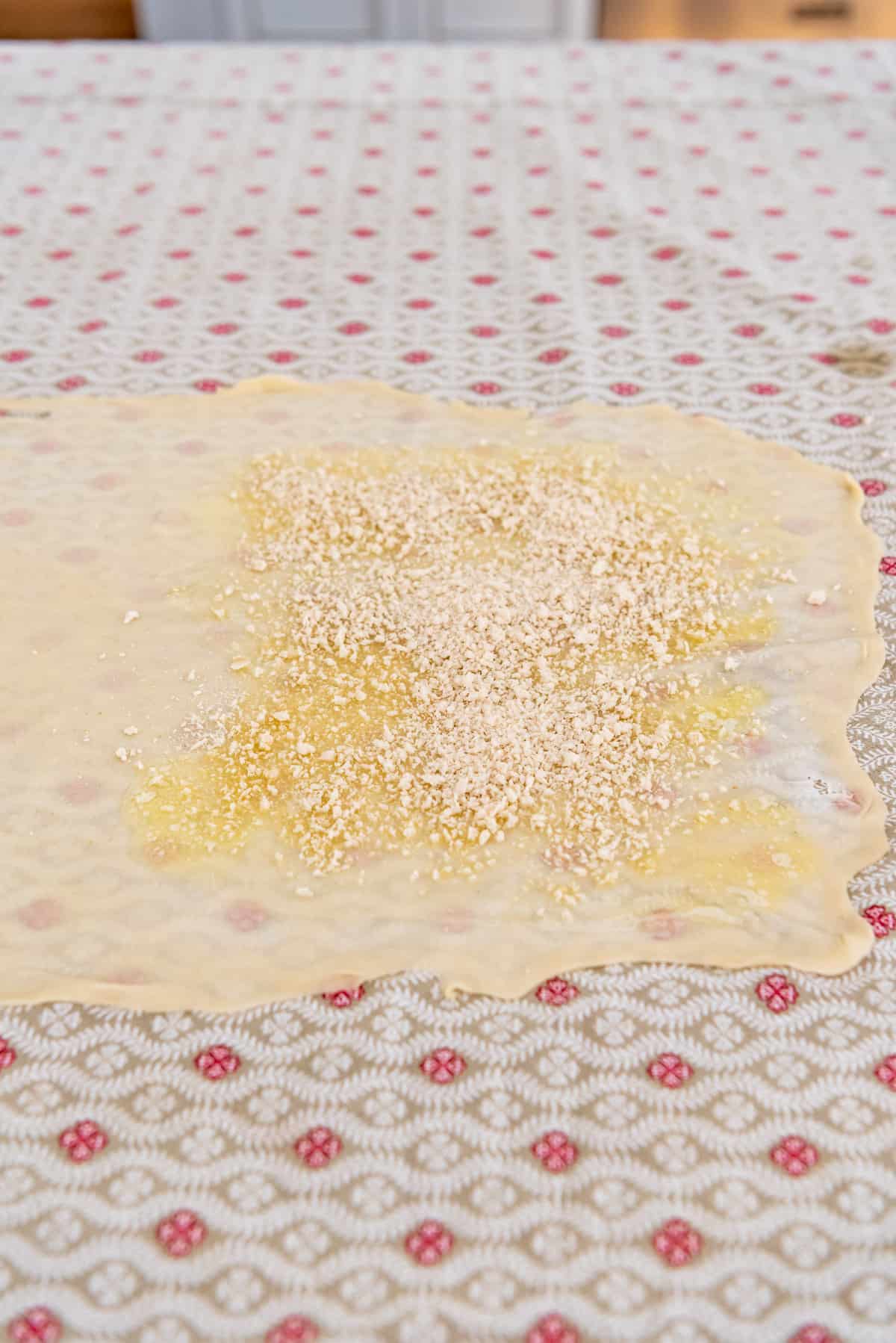
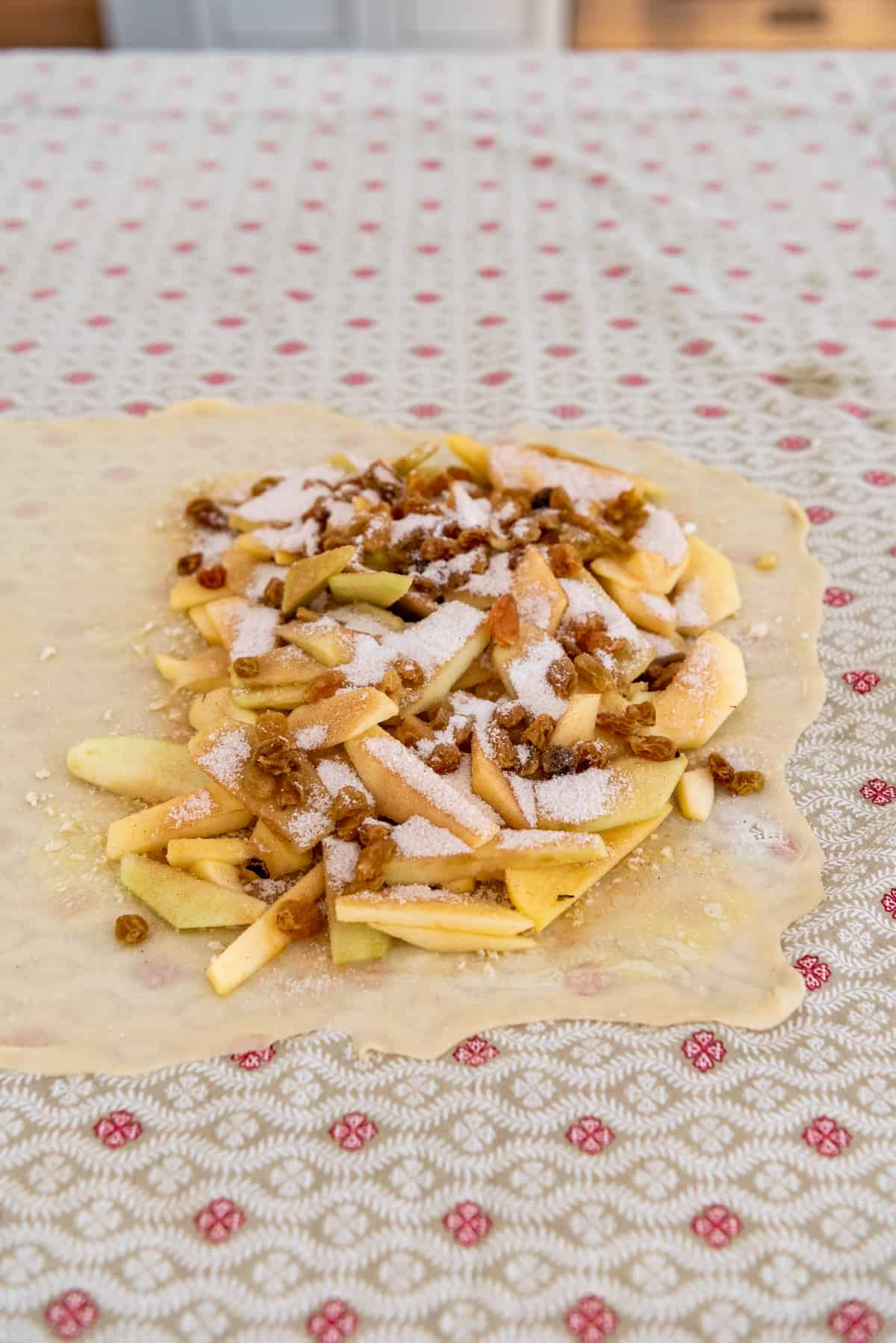
- Now here is the fun part! Fold the border over the apple filling on both sides to hold the apple filling inside the strudel as it rolls.
- Then grasp the cloth or sheet right by the long edge of the strudel on the filled side and using the cloth, fold/roll the strudel onto itself, just like you would cinnamon roll dough. Strudel dough is too delicate to roll by hand, which is why you let the tablecloth help you do the work of rolling it into a log shape.
- Adjust your grip on the fabric to be closer to the now partially rolled apple strudel and lift to roll the strudel again, continuing until the strudel rolls completely up on itself and making sure that the edges that were folded over don’t come untucked.
- Roll the strudel right onto your baking sheet lined with parchment paper rather than try to pick it up and transfer it by hand. I literally just held my pan at the edge of the table and used the tablecloth to roll the strudel right onto the baking sheet. Be sure to use parchment paper underneath so the strudel doesn’t stick to the pan.
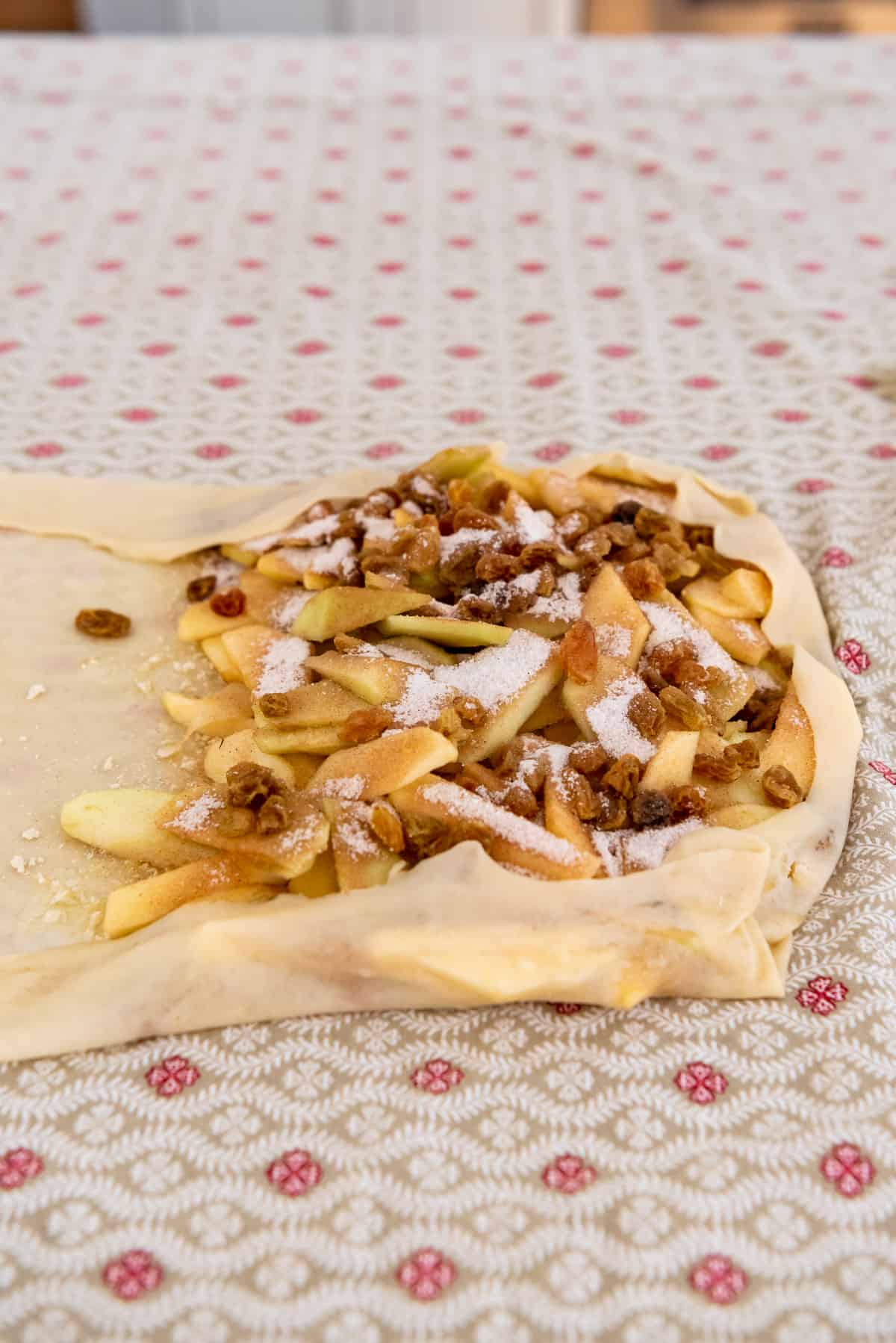
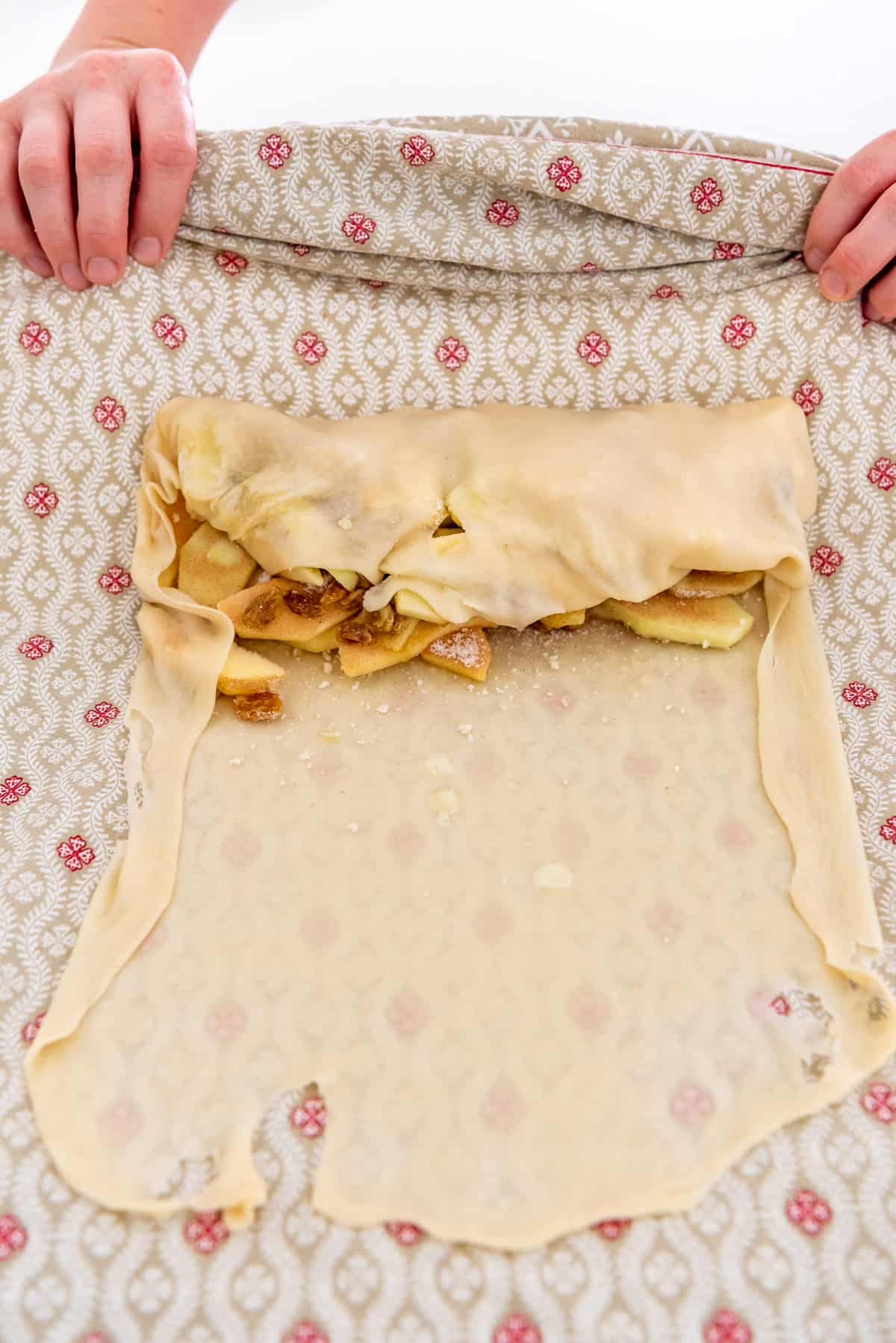
Pro Tip: If you opted to make one large strudel rather than two smaller ones and your strudel doesn’t fit on your pan, you can curve it into a “C” or “U” shape and no one will be the wiser when you slice it before serving.
Some people only make one giant apple strudel which they intentionally curve to fit on the pan. I just divided the dough in half to make two separate strudels because I find it easier to work with.
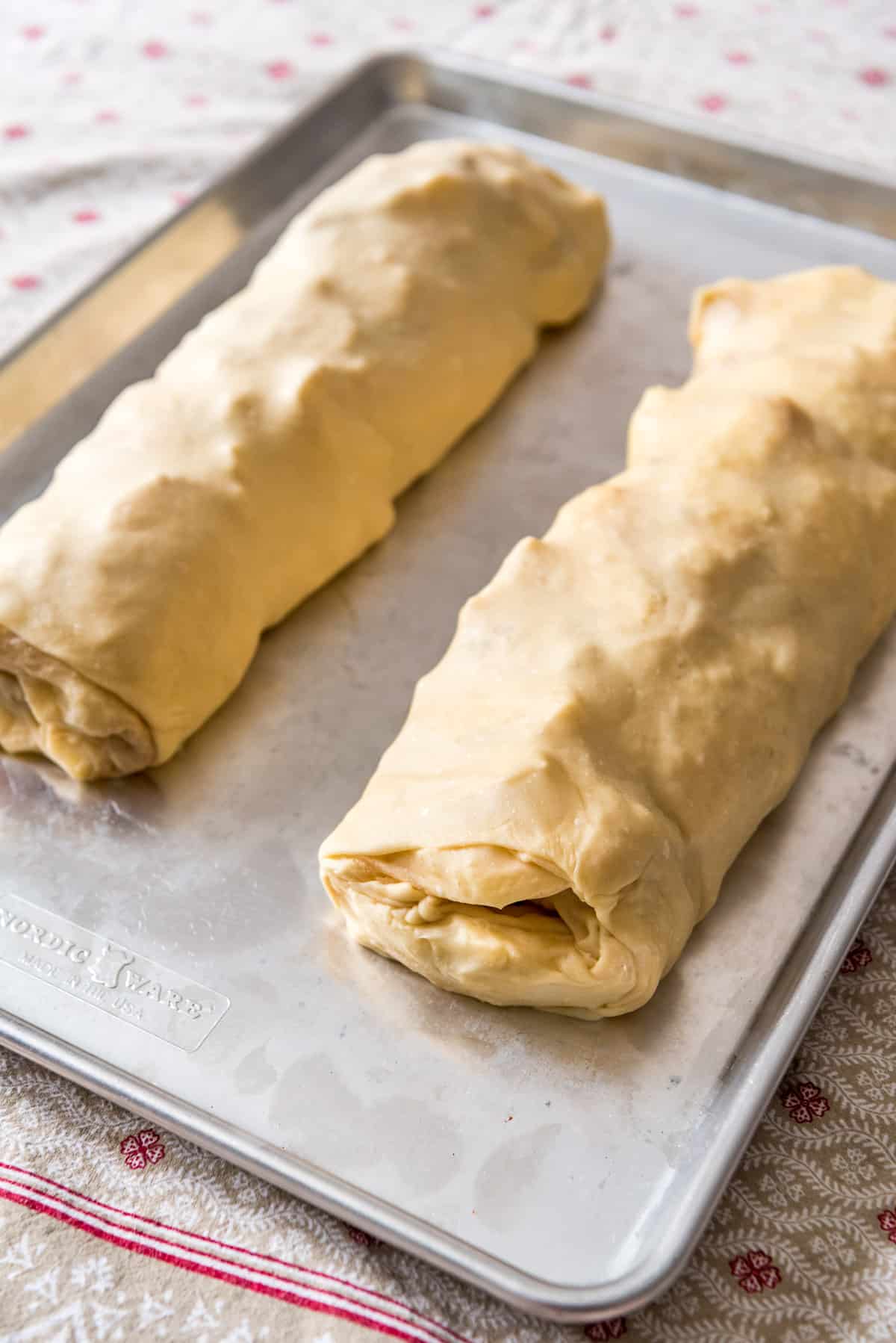
- Brush the tops with melted butter, then bake for about 30 minutes until golden brown on top!


- Let your apple strudel cool for at least 15 minutes before dusting with powdered sugar and slicing into 8 pieces. Serve warm with a scoop of vanilla ice cream, if desired.
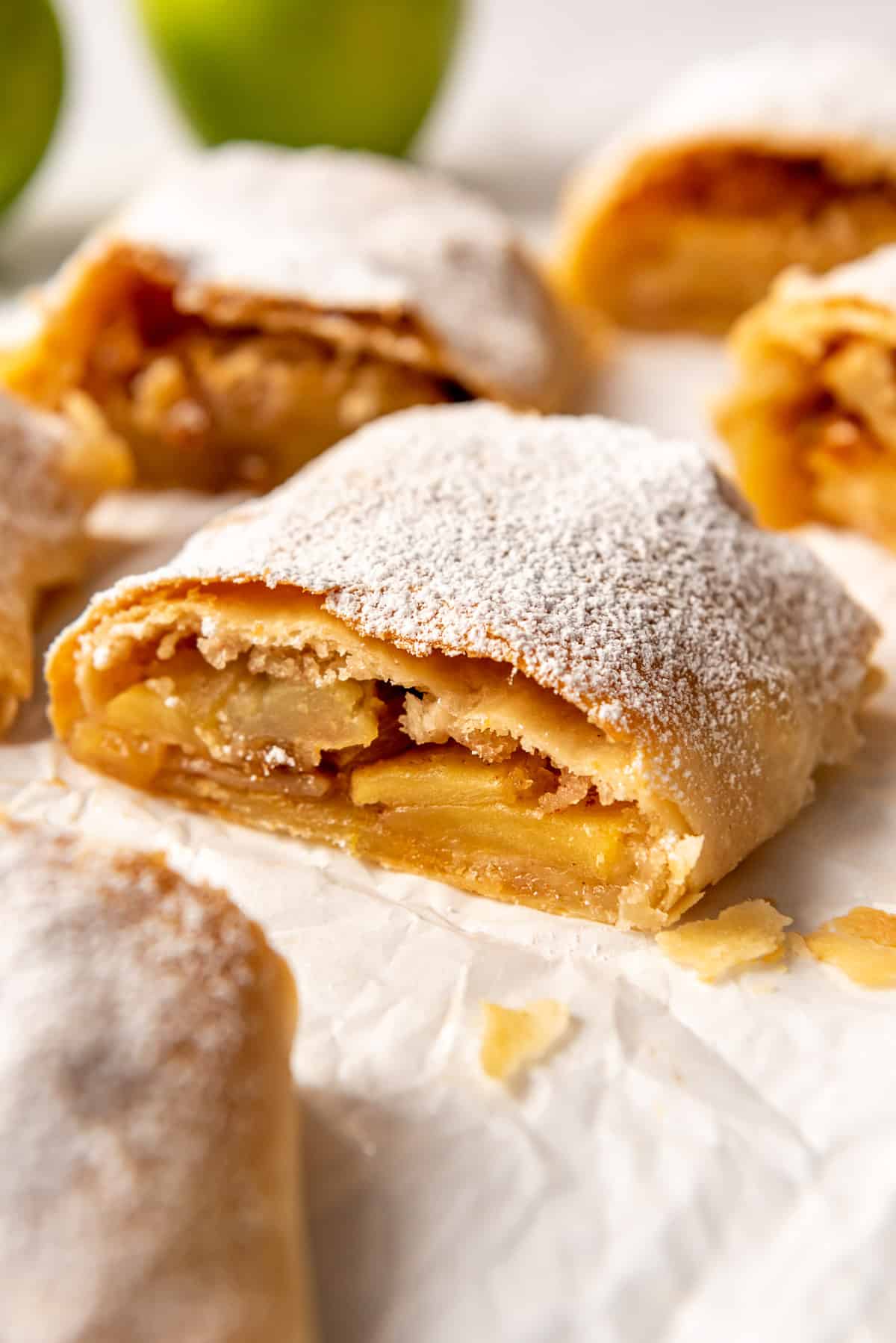
Recipe FAQ’s
While there are subtle variations like whether to include nuts or raisins in apple strudel, there seems to be a consensus that a traditional apfelstrudel recipe consists of an unleavened, elastic pastry dough that gets stretched (not rolled) incredibly thin, then is filled with breadcrumbs and a sweetened cinnamon apple filling.
Truth be told, this apfelstrudel recipe could really be Austrian, Czech OR German. From my understanding, the history of apple strudel is that is was invented in Vienna, Austria, but became popular throughout neighboring regions like the Czech Republic and southern Germany, particularly Bavaria, where Munich is located and Oktoberfest is celebrated every year.
Yes, if you want to make an easy apple strudel, you can use phyllo dough instead of making the traditional pastry.
This is really best eaten the day it is made while the pastry is still flaky and crisp, but it’s still delicious for 3-4 days. I recommend storing it in the fridge, although it would be fine on the counter overnight in an airtight container.
Pro Tips
- Don’t rush stretching the dough. If you try stretching it and it keeps bouncing back, cover it with a damp cloth and let it rest for 5 minutes before trying again. Sometimes the gluten just needs to relax for a few minutes.
- Measure your flour carefully using the spoon and level method. If you overmeasure, there might not be enough liquid and you might struggle with your dough.
- Slice the apples thinly and uniformly. This helps them bake evenly and avoid tears in the dough as the strudel gets rolled up.
- Based on my experiences living Germany for one summer (I know, it’s not much to go on) and traveling through southern Germany, Austria, and the Czech Republic, I definitely want my apple strudel to have raisins but no nuts. I tried making it with nuts recently, but it just didn’t taste the same as the apfelstrudel I would get during my travels.
- Oh, and while perhaps not traditional, I love a big scoop of vanilla ice cream to go along with my apple strudel!
Viel Glück und guten appetit! (Good luck & bon appetit!)
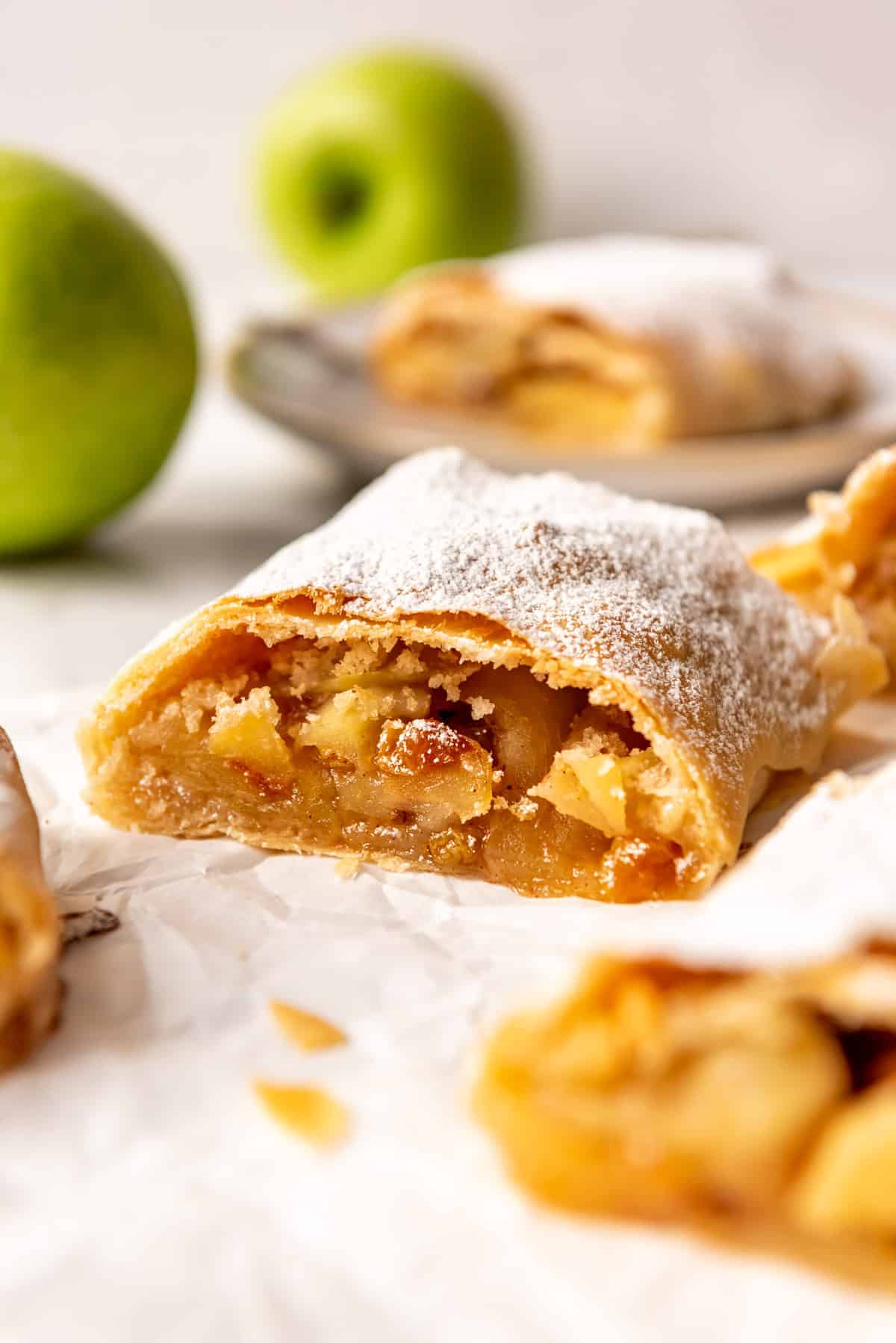
More Apple Dessert Recipes
- Glazed Apple Fritter Yeast Bread
- Homemade Caramel Apples
- Salted Caramel Apple Pie
- Best Homemade Apple Pie Recipe
- Apple Pie Macarons
More Favorites from House of Nash Eats
Did you make this recipe?
Let me know what you thought with a comment and rating below. You can also take a picture and tag me on Instagram @houseofnasheats or share it on the Pinterest pin so I can see.
German Apple Strudel (Apfelstrudel)
Ingredients
Strudel Dough
- 1 1/2 cups all-purpose flour (188g)
- 1/4 teaspoon salt
- 1/3 cup lukewarm water
- 2 Tablespoons vegetable oil
- 1/2 teaspoon apple cider vinegar or lemon juice
Apple Raisin Filling
- 3/4 cup salted butter melted
- 2/3 cup Panko breadcrumbs
- 2 lbs apples peeled, cored, and thinly sliced (about 6 cups)
- 2/3 cup golden raisins plumped in hot water for 10 minutes, then drained
- 1/2 cup granulated sugar
- 1/2 teaspoon ground cinnamon
- Powdered sugar for dusting

Instructions
- Combine the flour and salt in a stand-mixer. Using the paddle attachment, add in the water, oil, and vinegar while mixing on low speed until you get a soft dough. Change out the paddle attachment for the dough hook, then knead the dough on medium speed until a soft ball forms.1 ½ cups all-purpose flour, ¼ teaspoon salt, ⅓ cup lukewarm water, 2 Tablespoons vegetable oil, ½ teaspoon apple cider vinegar
- Transfer the dough to a clean work surface and knead for 2-3 minutes, until smooth. Slam the dough onto the work surface a few times to enhance gluten development, then shape into a ball and transfer the dough to a lightly oiled bowl, giving the dough a quick torn to lightly coat it in oil on top so it doesn't dry out. Cover the bowl tightly with plastic wrap and let the dough rest for 60-90 minutes.
- When the dough is almost done resting, heat the oven to 375°F. Place the raisins in a bowl of hot water to soak. Peel, core, and slice the apples into thin slices. Mix the sugar and cinnamon together. Cover your kitchen table or large counter space with a clean tablecloth or sheet.2 lbs apples, 2/3 cup golden raisins, ½ cup granulated sugar, ½ teaspoon ground cinnamon
- To stretch the dough, first move it from the bowl to a clean, dry surface and cut it cleanly in half with a bench scraper, pizza cutter, or large knife. Set one half of the dough to the side. Shape the other half of the dough into a ball and roll it out as thin as you can.
- Gently lift the dough and transfer it to the clean, flat surface covered by the tablecloth. Working gently, lift and stretch the dough a little at a time. When you first start, you can use your knuckles (be sure to remove all jewelry first) underneath the dough to stretch it like a pizza with the back of your hands. Continue to stretch the dough by lifting gently from the thicker edges and wafting a little air under the dough as you pull away from the center of the dough. As it thins out, the weight of the dough will mostly hold it in place on the tablecloth while you stretch out one side, then the other, increasing the size of the dough and stretching it thinner and thinner each time. As you lift and gently pull, you will see areas where the dough is thinning out and you will know the dough is thin enough when you are able to see the pattern of the tablecloth through the dough.
- Continue to stretch and pull the dough until it is paper-thin and a large rectangular shape. If there is a thick band of dough around the edges, remove it by gently tearing it away or carefully tug on the band, stretching the dough even a bit further to thin that thick band of dough out.
- Using a your hands (or a very soft pastry brush, although I find that my hands work best), gently spread ¼ cup of the melted butter over the entire surface of the dough, leaving a 1-inch border around the edges. Sprinkle half of the breadcrumbs over half of the dough, then place half of the sliced apples on top of the breadcrumbs. Cover the apples evenly with half of the raisins (and walnuts, if using) and half of the cinnamon-sugar mixture.¾ cup salted butter, 2/3 cup Panko breadcrumbs
- Fold the short end of the dough over onto the filling, then fold the sides over as well to create a sort of envelope edge that will keep the filling in place as you roll the strudel. Grab the tablecloth close to the short, filled end of the strudel and lift it, allowing the strudel to roll or fold onto itself. Keep lifting the tablecloth, rolling the strudel into a log, making sure the filling stays tucked inside.
- Carefully transfer the strudel onto a parchment-lined baking sheet, seam side down. Repeat with the remaining half of the dough and filling ingredients, reserving ¼ cup of melted butter. Both strudel should fit side by side on the same baking sheet with space between them. Brush the tops of both strudel with the remaining melted butter.
- Bake for 25-30 minutes or until the dough is golden brown. Remove from oven and allow strudel to cool for 10 to 15 minutes before slicing. Dust with powdered sugar before serving.Powdered sugar
Notes
- Apples: We like using Granny Smith, Golden Delicious, and Honey Crisp apples best. But Envy, Opal, Pink Lady, Braeburn, Macintosh, and other popular pie apples will all work.
- Rest the dough: If the dough keeps bouncing back when you try to stretch it, try covering it with a damp cloth and let it rest for 5 minutes before trying again. Sometimes the gluten just needs to relax for a few minutes.
- Measuring: Measure your flour carefully using the spoon and level method. If you over-measure the flour, there might not be enough liquid and you may struggle with your dough more.
- Uniform slices: Slice the apples thinly and uniformly. This will ensure that they bake evenly and help avoid tears in the dough as the strudel gets rolled up.
- Variations: Feel free to leave out the raisin and/or add in chopped walnuts (or other nuts).
Nutrition
This post was originally published in September, 2017. The photos and content were updated in October, 2021.
My helpers were front and center for this one the first time I photographed it back in 2017. They always come running whenever I am making something with apples because they love to eat the peels. Notice 3-year old Rose’s arms protectively encircling her horde of peels and her Snow White dress up dress that she wore constantly and 5 year old Clara’s missing front two teeth? Those were the days.
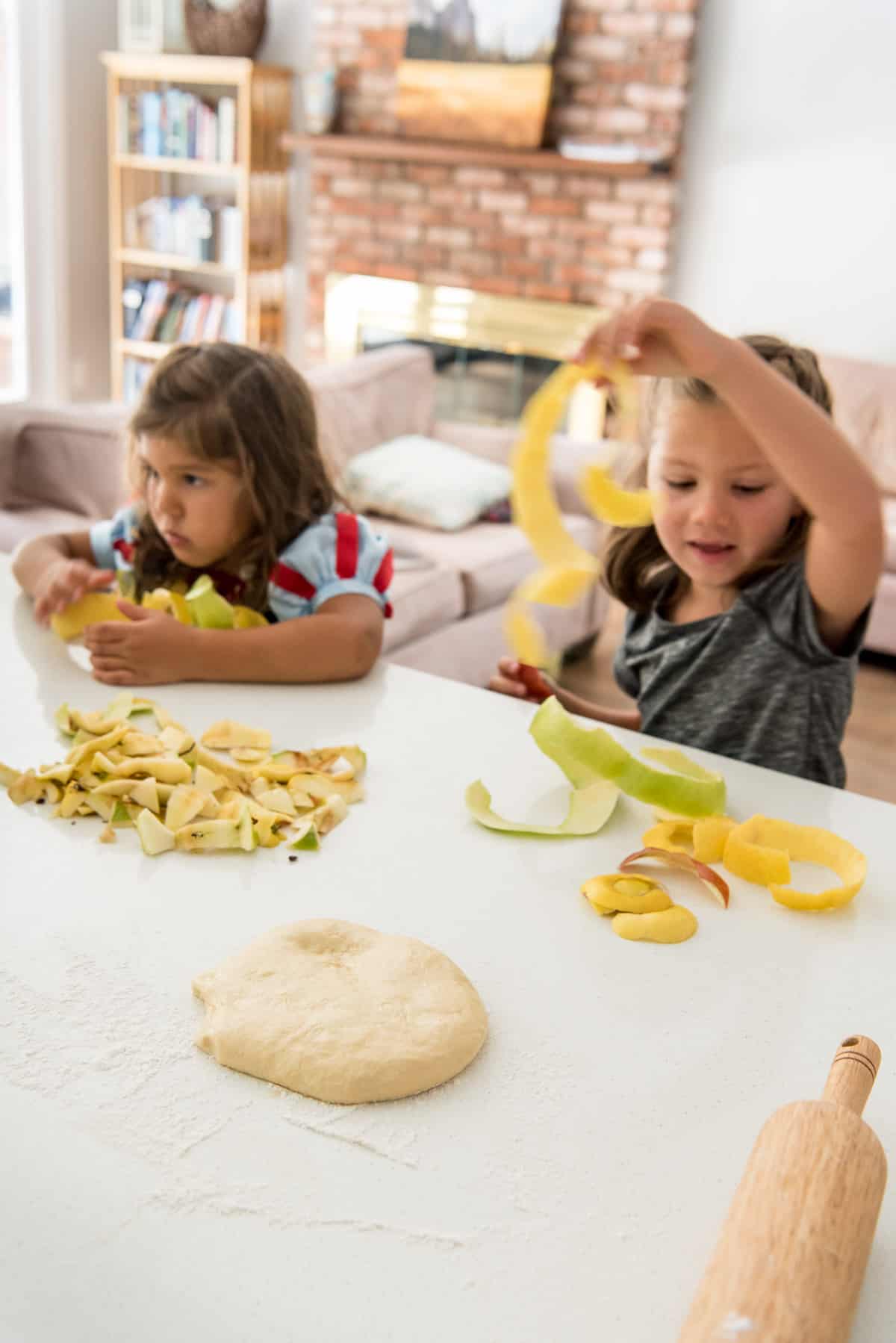

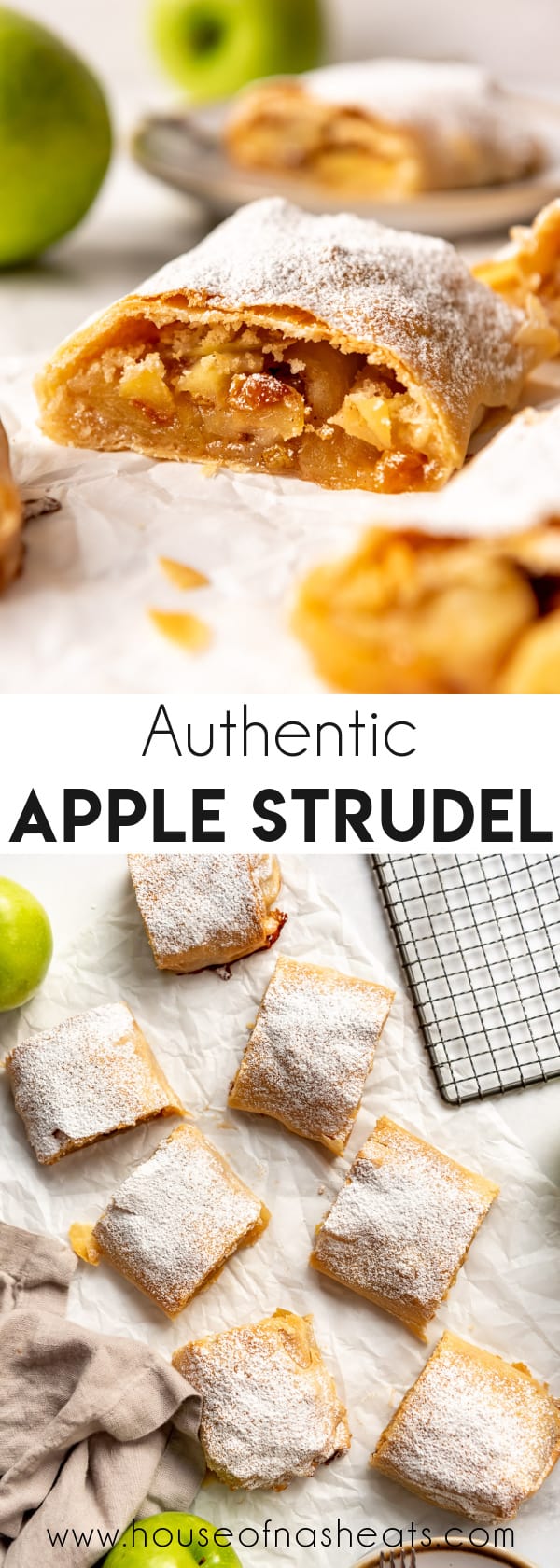


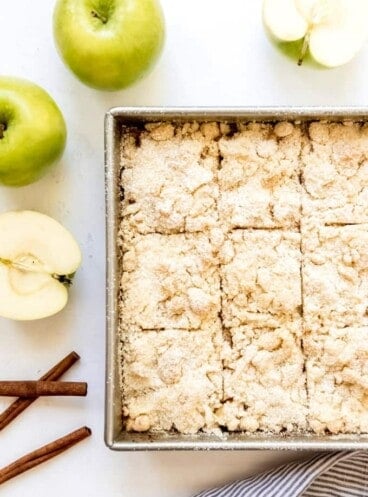

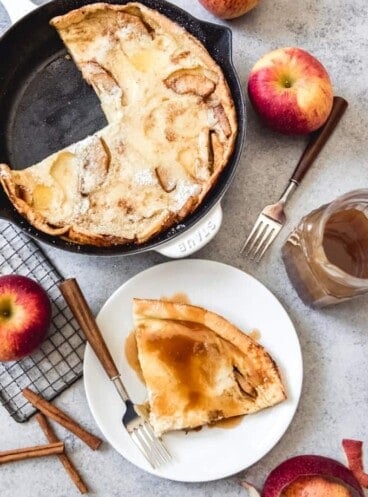

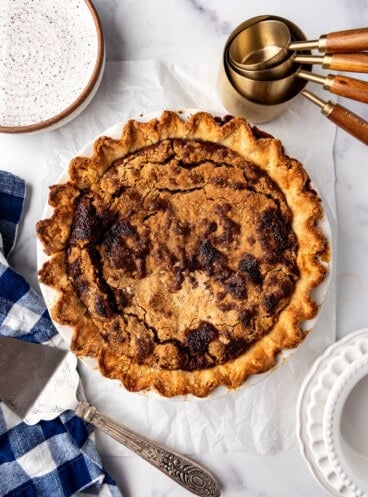
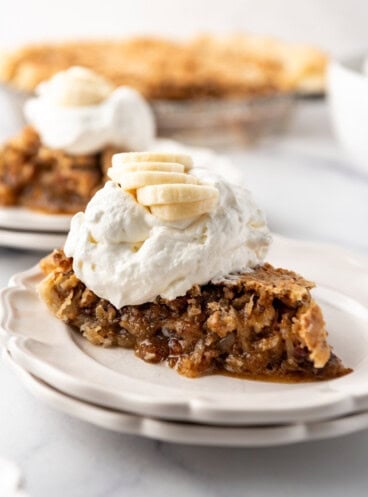



Panko breadcrumbs in Authentic Strudel? This pastry dates back to the 17th century or possibly even earlier than that. I doubt bakers back then had panko breadcrumbs in their pantry.
I have an old family recipe (100+years) that uses breadcrumbs. I am sure the recommendation for Panko bread crumbs was made to be a consistent unflavored breadcrumb
This is the same recipe my Hungarian family used and it is a good one. Thanks for posting.
If you don’t make your own bread crumbs….which older generations did, then use panko as a quick and easy substitute.
This is the silliest comment. They didn’t have panko in their pantry bc they’d use homemade breadcrumbs. Panko is the closest to homemade breadcrumbs if you’re not looking to go through that extra effort. You can certainly skip the panko and make your own breadcrumbs if you’d like to be more like our 17th century ancestors.
Sure they did. They called them breadcrumbs. Yummy!
I also took German in high school, and found myself over there (the first time) in ’85, for a 2-day vacation layover. Then again in 1991, for 6 months. I trained the Army during Desert Storm.
My experience was very similar – I loved the place, the food, the people. I had strudel everywhere I went – Germany and Switzerland.
Do you have a good vanilla sauce recipe? I usually just dilute vanilla pudding, but it’s not the same.
The one I usually use is the vanilla custard on my Irish Apple Cake. They are pretty similar, I think!
unfortunately this was the worst strudel dough i’ve tried so far
What is your preferred strudel dough recipe? I researched probably 40 recipes over the internet and the one thing that they all had in common was the dough recipe. There were a couple that added an egg, but it didn’t seem to be the norm.
I was taught to make this over 40 years ago by a old Kroation friend.
Never used panko crumbs but I do drizzle over the dough before apples and egg mixed with a small amount of whipping cream.
I think this keeps it from being runny
I’m teaching my 40 year old son to make it now
First time trying. I followed the directions, had to add water to the dough to get the right consistency but it all worked perfectly. I soaked the raisins in Grand Marnier.
Yay! Good job!
I made this for Apple Strudel Day on 6/17/24. First time I made strudel, I think it came out pretty good, looks just like the recipe pix! I omitted the raisins. Tastes great, nice and flaky, not overly sweet.
https://www.facebook.com/share/p/QpYg8wq17vEv7YNu/
Looks great! How fun to make it on Apple Strudel Day! Way to go!
It turned out ROCK HARD…not sure why. I had to add some extra flour for dough ball to form in mixer.
I loved the recipe! I’d gone through a few different ones and this one looked the best and I’m so glad I chose it!
I do have to add that your website is a bit of a nightmare on mobile… it kept refreshing and bringing me to the top of the page. Quite frustrating!
Thank you! I am glad you loved the recipe. Hmmm I am sorry you were having trouble with the mobile website. I will have to look into why it was doing that! Something that helps while I am cooking on my phone is find that switch that says “Cook Mode” and switch it on. It prevents your screen from going dark. Sometimes when it goes dark it resets to the top of the page. Again, I will look into why it would do that!
OMG! I can’t believe that I “found” this recipe! Thank you so much for posting it! It’s exactly the same as the apple strudel I learned to make at a Bavarian Cooking class I took over 40 years ago. I made it so many times in the beginning but then lost my recipe whenI moved. I can’t tell you how trilled I was to see this posted. I had to try it immediately and it was absolutely PERFECT! I’ve printed out three copies and also saved it on Pinterest just to be sure I never lose it again. THANK YOU!!!!
Wow! That would be so sad to lose a recipe, I am so glad you found this! That makes me so happy you love this recipe. Sounds like you will never lose it again!
Can’t tell you how many times four generations of women using a four by eight sheet of plywood prepped and baked twelve apfel strudel just before every major holiday. The only difference was that we spread the filling across the dough and lifted the linen sheeting to roll the strudels. Yours is a grand recipe with great directions!
Wow what a fun history of Apple Strudel traditions! Thank you so much!
Bake at what temperature?
Hi! It’s in step #3 in the instructions. Heat the oven to 375°F. Let m know if you have any more questions!
In my high school German Club, we made these apfelstrudels to sell as a fund raiser. They were never a traditional dessert in my German family, so I never baked them with my Oma.
I wanted to put making an apfelstrudel in the current book I’m writing and had to search for the traditional recipe we used. This is it! Thank you!
Thank you! What a fun treat for a fundraiser. Glad you found this recipe to help you out!
I’ve made this several times using a different recipe. I couldn’t find it, so i tried this one. The dough was much too dry to stretch.
thanks
The dough calls for only 1 1/2 cups of flour. Is this right. The ball was very small and rubbery. I stretched it as well as I could but it wasn’t very big.
Have you let the dough rest for 60-90 minutes before stretching it? Don’t rush stretching the dough, the gluten needs to relax. If you try stretching it and it keeps bouncing back, cover it with a damp cloth and let it rest for 5 minutes before trying again. Also, if there is too much flour it will get tough and too hard to stretch. Elevation and humidity can also affect the dough.
I am not a “dough” person, has anyone substituted phyllo or puff pastry?
First off I want to say Thank You for this recipe. I just made it a third time but this time I made a Brie en Croute. First time I made it with plain flour and got it nice and thin but it was a tough dough. Second time I used bread flour and had to roll it out because it was so tough and springy. Third time’s a charm. I am positive that the recipe needs to be 1/2 cup of water. Used bread flour and just adjust that water and no rolling needed. It was tender and moist. I knew it was going to be good when I was kneading it. Love this easy flaky pastry. Thanks again.
I have now tried to make the dough twice to your exact measurements and instruction and it has turned out to hard to stretch
Once its out of the mixer, knead it by hand for a couple of minutes on the counter. Go ahead and slam it down on the counter a couple of times during the process. The purpose is to develop the gluten so you will have a nice, elastic dough later on. Have you let the dough rest for 60-90 minutes before stretching it? Don’t rush stretching the dough, the gluten needs to relax. If you try stretching it and it keeps bouncing back, cover it with a damp cloth and let it rest for 5 minutes before trying again. Also, if there is too much flour it will get tough and too hard to stretch. Elevation and humidity can also affect the dough. I hope some of this helps.
Let me know if you have any more questions!
My Yiddish grandmother made this often but never shared it with me. I was the outsider irsh adoptie thank you for sharing.
I am glad you found this recipe. I hope you enjoy it!
Simply delicious! Turned out great and everyone loved it. Definitely plan to make again!
Great! Thanks for making it!
One of my fondest memories is watching my Hungarian grandmother make the Hungarian version on her big and wide wood table. She put a printed tablecloth on the table and the rolling and stretching of the dough. My brother and me would sit at the table waiting for the overhang so we could take pieces off to eat! My grandmother would catch us and I think she was cussing us out in Hungarian! Regardless of the not knowing the translation we knew not to continue stealing dough bits.
What a sweet story, even if she was getting mad at you ;). I love that food can bring such fond memories.
I look forward to making this. I’m a visual person, so do you have a video showing the prepping steps for us visual people?
Yes I actually do have a little short video of me making a strudel. Just click the link and it will take you to my Youtube channel. Let me know if you have any questions! https://youtube.com/shorts/8ouVQhXznfI?si=_0DObZx8-hQkJTMH
The strudel was very delicious but the dough isn’t enough for two rolls cause they came off as very veryyyy thin. Otherwise it was a good recipe.
Just like my memories of Poulsbo as a child! I sometimes use red hearts candies in these. No one taught me that , buy it’s good
I printed your Apple Streusel recipe but the adds over rode the printing, not to happy about that. I ordered your book, Hope the recipe is in it.
Did you print using the “print” button? It should not print with ads on it. It prints directly from the recipe card.
Is it necessary to make slits in the dough to lets steam escape? Or do the bread crumbs do enough to soak up the moisture so the pastry doesn’t get soggy?
In my experience doing both has produced better results. Too much steam can build up with the filling so the steam will need to escape if you want a crispy, flaky crust.
Looks delicious! Would it be possible to prep the strudel a day before and then bake it the following day, or would the dough get too soggy.
Thanks! This one I would bake same day. The apples can go brown and the juices can start to affect the dough. It’s better fresh.
This recipe really made my young girl memories!! My Hungarian grandmother would make apple strudel. She would roll the dough on a flowered table cloth on her large kitchen table. When the dough reached my brother and I would pinch off little pieces of dough to eat. My grandmother would catch us and start yelling in Hungarian! We just giggled. But she rolled the dough so thin you could see all the flowers on the tablecloth under the dough.
I will try this recipe with a smile!
Great Sha! I absolutely love your story with you and your little brother! Food can create such nostalgic, long lasting memories! Let me know if you try this recipe!
greetings, no, I haven’t yet tried this recipe, but I am very excited to once my chore provider can procure some of the ingredients for me when she comes back from vacation.
However, I do have a question. Here is your step 8: ” Once your apple strudel dough is sufficiently thin enough for you to see the pattern of your tablecloth through it, gently spread it with butter and sprinkle half of it with the breadcrumbs. These will soak up some of the juice released from the apples as they cook so you don’t end up with a soggy strudel.”.
In order to get around any damage and worry caused by the release of excess juice(s), would it affect the outcome at all were I to essentially cook the apple ingredients of the strudel first in another pan and then wrap it in the strudel dough? I use this technique to avoid this type of “juice” damage when I bake an ultra-flaky crust for my apple pies (where I use a lattice covering of the pie instead of a solid covering.
Yes, that is an option of adding the cooked apples to the dough. Just make sure the apples are not cooked too much or they will be mushy in the pastry. I would still use the bread crumbs though to catch any extra moisture. Cool the apples before adding to the dough or else it can make the dough a little gummy. Bake the strudel and keep an eye on it until it is golden brown.
This recipe is fantastic! Just like Grandma’s back in the day!
Thank you Halle! There is no greater honor than being similar to Grandma’s recipe!
I have been staring this recipe down for a couple of years because I was little intimidated by the pastry stretching process… but this made my teenagers’ soon-to-retire German teacher and the 30 students in advanced German classes really happy today. There were a lot of comments about it being delicious, the right level of sweetness, etc, and there were no leftovers. I was really happy I decided to do this drive-by strudel delivery. I doubled the recipe to serve 30 people (4 smaller strudels) and baked and transported them in disposable 13×9 inch pans. I also should say that I made them to the point of putting them in the pan, and then froze them a week ahead (when I had more time) and then added 15-20 minutes of extra baking time (but still baked from frozen at 375). I will definitely be making this again. The smell in the car was absolutely divine. Thank you!
Oh Annie I am so proud of you for facing your fears and making the apple strudel! Sounds like you were under somepressure but you nailed it! Good job and good idea freezing it before.